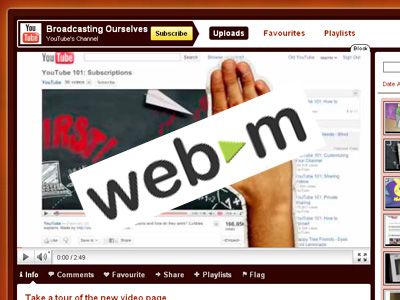- Qualcomm Launches Snapdragon 4 Gen 2 Mobile Platform
- AMD Launches Ryzen PRO 7000 Series Mobile & Desktop Platform
- Intel Launches Sleek Single-Slot Arc Pro A60 Workstation Graphics Card
- NVIDIA Announces Latest Ada Lovelace Additions: GeForce RTX 4060 Ti & RTX 4060
- Maxon Redshift With AMD Radeon GPU Rendering Support Now Available
H.264, Theora – Move Aside for WebM
Google purchased the video codec company On2 back in August last year, owners of the VP8 video format. Many believed it to be the first steps from Google to settle the battle of Theora vs. H.264 in the online video codec’s for HTML 5. Fast forward to today and Google, Mozilla and Opera announce the launch of the new, open-source, royalty free, WebM Project. The project is that of a hybrid codec suitable for the Web without the encumbrance of royalties and patents that come with H.264. Mozilla’s Theora video has been thrown out and replaced with the Google owned VP8, coupled with the Xiph owned OGG Vorbis codec for audio, all wrapped in the Matroska Container format (that’s MKV to you and me).
It’s not just the browser developers getting in on the action, but hardware companies like AMD, ARM, NVIDIA, and Qualcomm. This is so that hardware acceleration of the new WebM format can be brought to the masses. Even Adobe is on board by building support for WebM into Flash. Filters have been released for the FFmpeg library and Microsoft’s Directshow framework, meaning anyone who updates their media players that use the Directshow framework (Media Player Classic, etc), will be able to use the new codec.
As for Microsoft’s stance with IE9 being a monogamist when it comes to Web based video codec’s, in that it will only officially support H.264, the gate has been left open for third party codecs due to its support for Media Foundation, the built in API that can load Directshow filters for video decoding. While IE9 will not natively support WebM, it means any user who has the WebM Directshow filter installed will be able to watch the new format. People without the filter will need to install it, but this isn’t any different from plugins like Flash. Apple’s response remains to be seen, since it actually owns a number of patents used in the H.264 codec, but with enough pressure from hardware and software developers, they may soon come around.
While I am sure there are kinks to iron out with regard to patents, etc, this is still a step in the right direction for open Web based Video, though it does leave me wondering as to the fate of Theora.

Ever since Google announced its purchase of video codec company On2 in August 2009, there’s been an expectation that On2’s VP8 codec would someday be open-sourced and promoted as a new, open option for HTML5 video. An open VP8 would offer comparable quality to H.264, but without the patent and royalty encumbrances that codec suffers.




